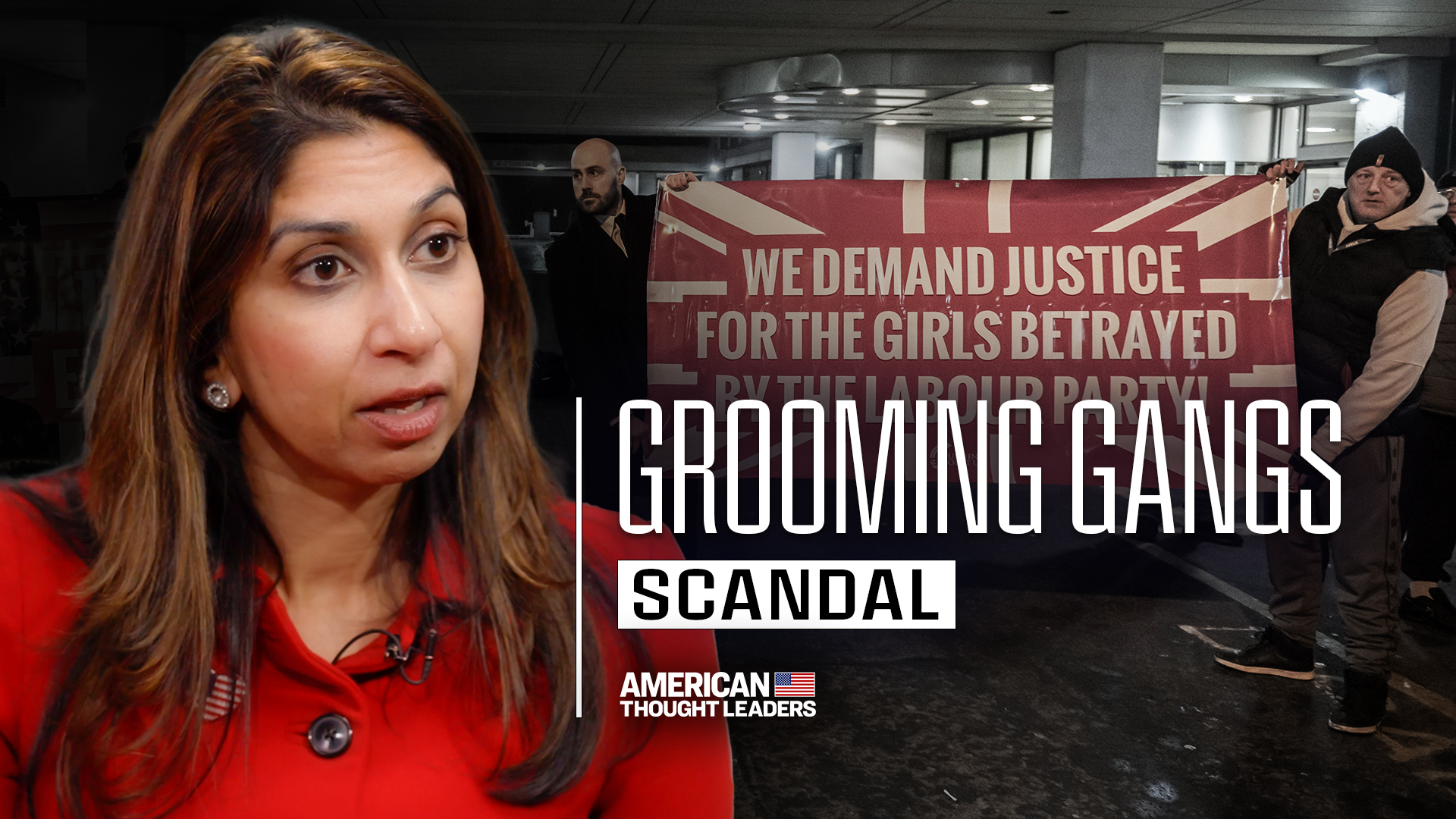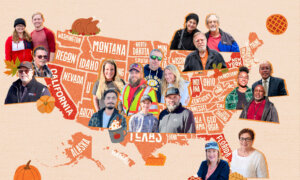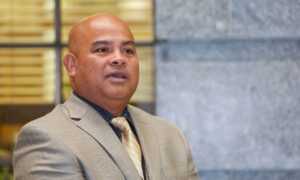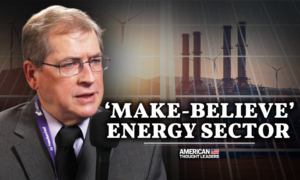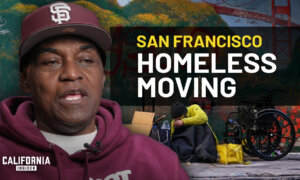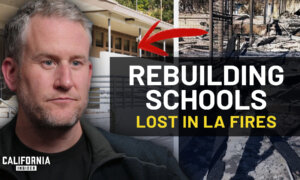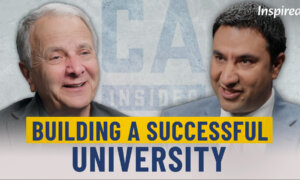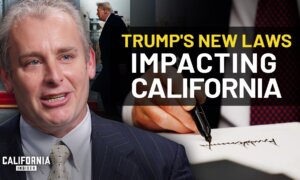[RUSH TRANSCRIPT BELOW] Suella Braverman is the former home secretary of the United Kingdom, and a conservative member of the British parliament. While she was in Washington for President Donald Trump’s inauguration, we sat down to talk about what’s been happening in the U.K., and what Trump’s election means to her and her constituents.
“We need to learn a lot from the MAGA movement, from the success of the Republicans under Donald Trump, and really try and apply some of those lessons to U.K. politics right now, because we are mired in the depression, the recession, and the doom and gloom over socialism,” said Braverman.
We discussed the grooming gangs scandal currently making headlines in Britain, in which predominantly migrant gangs of men have been sexually assaulting and abusing young girls for roughly two decades.
“The Pakistani men who were involved in this abhorrent behavior were targeting white girls for a specific reason—that they have an outdated, unacceptable view of women. And the authorities failed to act because they were scared of the charge of racism,” said Braverman. “It’s one of the biggest national scandals in our history.”
We also discussed issues related to anti-Semitism and free speech.
“We’ve got this problem in the U.K. of hate marches, where extremism, antisemitism, and Islamism can be paraded on our streets, and the police won’t take any action. And it’s caused a real increase in antisemitism, and it’s made parts of our streets and our public realm no-go zones for Jewish people,” she said.
“We have a crisis of free speech in the United Kingdom, and I use that word deliberately. We have a situation where the police have the powers to record your information and log your details, if you’ve said something that might be offensive to someone. It doesn’t matter about the objective nature of what you’ve said. If someone, somewhere, happens to be offended by what you have said, and it relates to a personal characteristic, race, gender, religion, or sex, then that’s it. The case is closed. You will be considered guilty of what we call a ‘noncrime hate incident.’”
Views expressed in this video are opinions of the host and the guest, and do not necessarily reflect the views of The Epoch Times.
RUSH TRANSCRIPT
Jan Jekielek: The Right Honourable Suella Braverman, such a pleasure to have you on American Thought Leaders.The Right Honourable Suella Braverman: Thank you very much. Pleasure to be here.
Mr. Jekielek: I noticed on X that you have been following the movement of the bust of Sir Winston Churchill from in and out of the Oval Office over the years and that he’s back. Why is that significant to you?
The Rt Hon Suella Braverman: Oh, it’s so significant because Winston Churchill is not just a British hero, but a hero for Western civilization. And it’s thanks to Winston Churchill’s courage, focus, determination and bravery, above all, that fascism and the Nazis were beaten. With thanks to the Americans, of course, and the Allied forces in World War II. But he symbolizes, he personifies in many ways, the beginning of the special relationship.
Indeed, it was he who coined the phrase, the special relationship between the US and the UK I think it’s symbolic and symbols are very, very powerful today. The symbolism of having his bust back into the White House speaks volumes about the way in which this administration views the UK-US relationship.
Mr. Jekielek: Speaking of symbolism, I can’t help but notice that you have a heart American flag on your lapel.
The Rt Hon Suella Braverman: Yes, exactly. Listen, I’m a big America fan. I love the story of America, the spirit of America. I’ve had some great experiences in America. I was so inspired by America that I sat for the New York bar exams 20 years ago for the fun of it. And I passed the exams.
They were very, very hard exams, possibly the hardest law exams I’ve ever sat in my life. I was able to do a stint working in a New York law firm for a short time about 10 years ago. I think there’s the potential of America and the impact that America has on the rest of the world is enormous. And so I’m on the side of being a friend of America.
Mr. Jekielek: So what are the implications, aside from some sort of symbolism around the strengthening of the UK-American relationship? What is the significance of this election, this inauguration of Donald Trump?
The Rt Hon Suella Braverman: I think it’s enormous. Donald Trump has not just shifted the Overton window, he’s shattered it. And that’s very influential upon us in the United Kingdom when it comes to right-wing politics and what we can do to save our country and make Britain great again. We need to learn a lot from the MAGA movement, from the success of the Republicans under Donald Trump, and really try and apply some of those lessons to UK politics right now.
Because we are mired in the depression, the recession, the doom and gloom of socialism, I’m afraid, newly elected, not a year old, and we’ve got about four years, at least, of a socialist, woke, high immigration, high taxation, low growth, net zero militants government. And it’s the British people who will suffer. So there is a lot that we can learn from the success here in the United States.
Mr. Jekielek: What would you say the big lessons are then?
The Rt Hon Suella Braverman: I think Donald Trump has prosecuted the case for raw, unfiltered, common-sense conservatism successfully. It’s based on a program of strong and secure borders. An unapologetic, robust approach to your southern border is exactly what we need on our southern border. We have a crisis when it comes to illegal migration in the United Kingdom where we have small boats and thousands of people, not millions, the scale is very different to the US, but thousands of people, tens of thousands.
Now it’s topped 100,000 in total over the last four or five years of people coming into the country illegally. We don’t know who’s coming into the country. Some of these people are causing harm to the British people. And that is a basic failing of the government.
Secondly, we need a government that is focused on economic growth, tax cuts, deregulation, cutting public spending, and reducing government waste. The Department of Government Efficiency is a model that we can emulate in the United Kingdom because we have soaring debt, a deficit which is increasing. The Conservatives managed to cut that when we were in office. Inflation, I believe, will rise under this Labour government eventually.
As I said, we are teetering on the brink of a recession in the United Kingdom because of the extortionate level of taxation that this government is imposing on the British people, on workers, on business, on entrepreneurs, on wealth creators. And Trump has put forward the case to scale back on the net zero extremism. And unfortunately, we’ve got a net zero extremist who is responsible for our energy policy in this Labour government. I call him militant Miliband because he is wide-eyed and pretty crazed when it comes to pursuing the net zero, carbon free agenda.
He’s a kind of guy who’s you know who doesn’t care about the costs of renewable energy and energy transition and so he’s shutting our gas stations, he’s not issuing licenses for gas exploration or drilling in our North Sea where we have rich supplies. He’s come perilously close to running out of power, actually. The lights have almost gone off in the United Kingdom because he’s not pursuing a sustainable energy policy. It’s driven by idiotic ideology. So on the net zero agenda Donald Trump is absolutely right with his drill baby drill mantra.
And then lastly you know Donald Trump represents the fight against DEI and woke nonsense. You know when he talked about in his inaugural speech a merit-based society making it government policy that there are only two genders male and female. You know that was music to my ears and it’s something that we desperately need in the United Kingdom. We’ve got a situation where there have been conservative MPs in the past who have taken the knee. There are calls for reparations to be made to atone for the sins of the British Empire, a phrase I would strongly refute.
We have ministers who have in the past said that a trans woman is a woman, defying biology and defying truth. So we have a real battle when it comes to restoring fairness and meritocracy into our workplaces and our public institutions. And I think those are some of the lessons that we can learn as Conservatives, but also more broadly as a country from the US.
Mr. Jekielek: We started talking about gender ideology. In some ways, the UK is ahead in banning purity blockers, for example.
The Rt Hon Suella Braverman: Yes. So we have been able to mitigate some of the excesses and begin to turn the tide. You are right. And that, I think, is thanks to the UK Conservative administration. So when we were in power, whilst the problem did get to a very serious level of young people, children undergoing irreversible gender reassignment surgery, child abuse as I would call it in many ways, sanctioned by the state, or where we’ve had men take part or biological males take part in female sports or use female only spaces like prisons or refuges or all those kind of things. Where we have had some of that problem, what we did do was we commissioned a review and we got an independent medical expert to review the situation, Dr. Hilary Cass. She wrote a seminal report which concluded that there were problems with this approach. There should be much more caution applied when it comes to the treatment.
Mr. Jekielek: And if I may, which led to the shutting of the major gender clinic in the country.
The Rt Hon Suella Braverman: Yes, nominally. The Tavistock Clinic, which has been responsible for the thousands of children who’ve undergone this damaging surgery, has been ordered to shut. And so there is a reversal of the policy. The ban on puberty blockers was implemented by the Conservative government. It’s been maintained by this Labour administration, which is good news.
And so you’re right, there are measures which have been put in place to try and turn the tide. And I think that’s thanks to conservative political resolve, and also thanks to high profile campaigners. I think JK Rowling has been pivotal in shifting the consensus. And that’s been very, very effective.
Mr. Jekielek: I want to get you to tell me a little bit about yourself. Of course, you were the attorney general at some point. You played many, actually, quite significant roles. And then you took the New York bars. I did notice something about that as I was reading up. I was like, that’s fascinating. Tell me a little bit about your background and how you got to today. And oh, and by the way, in talking about empire, I can’t tell but can’t help but notice that you’re Indian.
The Rt Hon Suella Braverman: Yes, how far back do you want me to go? Because I could actually go back to the 19th century in terms of my background. We’ve done some research on my ancestry. But my mother is from Mauritius, and my father is from Kenya. And so they were born under the British Empire in the 1940s. And they grew up really with admiration and gratitude for the British Empire. They saw the good that Britain did for the world in the Victorian era, in the 1800s, in the 1700s and the 1800s and into the 20th century.
Take India. The British built the railways and the ports and the infrastructure and the irrigation, and in Mauritius, the legal system and the parliamentary system. In Kenya, again, the railways and infrastructure and the civil service were all fruits of the British Empire. And they laid the foundations for subsequent prosperity for these countries when they gained independence. My parents came to the UK in the 1960s after independence was gained by their countries. And they met in the United Kingdom. And then they made their life in the UK.
My dad actually came because he was kicked out of Kenya. When Kenya got independence, there was a real expulsion of the Asians from Africa. The policy of Africanisation was in place, and it meant that people of Indian heritage had a very perilous situation. And so my father was a young man, and he faced very few prospects in Kenya, and the British granted him citizenship. He often tells me about the day in 1968 on a cold February morning when he stepped off the plane at Heathrow Airport in London and he had no one—no friends, no family, no money. It was only his British passport that was his symbol of hope. And it was Britain that offered him security and opportunity.
My mother came to the UK for different reasons. She was a girl, a teenager, and she was recruited by the NHS, our national health service, after the war. And she took up an offer to train as a nurse when she was 18. And so she came over for work reasons and she worked as a nurse for 45 years in the UK with the NHS. During the Thatcher years, my mother in particular really got interested in her community and indeed in her country. She joined the Conservative Party and was an activist and a local politician.
She became a councillor, which means that she sat and represented a small community on her local board and local council. She served as a councillor for 16 years. So she was always getting involved in campaigns and elections and politics. And I grew up around that. And I grew up around election campaigns. You know, every few years, our front room would be transformed into a campaign headquarters with maps and leaflets and rosettes. And so it became a very strong part of my childhood.
Then when I was an adult, I got involved in student politics at Cambridge University and I chaired the Cambridge University Conservative Association. I was studying law. I qualified as a lawyer, a barrister, and I worked for a decade as a barrister in London and around the country, specialising in public law, administrative law and judicial review and immigration. A lot of that area of law takes you into the field of immigration and I defended the Home Office in a lot of immigration and asylum cases as a lawyer.
I then got elected to Parliament to represent an area in Hampshire, a beautiful area called Fareham on the south coast. I’ve been the MP in Fareham for 10 years, it will be 10 years this May. In that time, during my parliamentary career, I served as a minister in the Brexit department. We had the referendum in 2016, and the British people voted to leave the European Union.
We set up a new department called the Department for Exiting the EU, DExEU. I was a minister in that department tasked with delivering this massive constitutional change. So I served as a Brexit minister under Prime Minister Theresa May. I was then Attorney General under Prime Minister Boris Johnson. Then I was Home Secretary under Liz Truss and Rishi Sunak.
Mr. Jekielek: And did you leave the May government?
The Rt Hon Suella Braverman: I did. I’m one of these politicians who has a few principles and sometimes they get in the way, basically. So I was very much a Brexit enthusiast. I campaigned to leave the European Union in 2016 and I was very cheered on by the chutzpah of the British people when they decided to leave the European Union. I didn’t think we were going to win the referendum but we did.
I wanted us to take back control over our borders because previously it was the European Union who controlled our migration policy. Take back control over our laws, because previously it was the European Parliament that set the dictates on what laws we, the limits of what our laws could be. I wanted us to take back control of our trade policy, because previously it was the European Union that dictated with whom we could have trade deals. So on laws, borders and trade, I thought there was a very strong case and ultimately sovereignty.
The UK Parliament is the mother of all parliaments, and I really felt that self-government was the right thing for us to do. So that’s why I voted for Brexit. Those were my objectives. Unfortunately, what happened under Theresa May is that the negotiations failed and she was unable to present a Brexit deal that honoured those objectives that I set out—control of our borders, control of our laws, coming out of the single market and the customs union and full extrication from the EU orbit. And so her deal was a failure.
It was called BRINO, Brexit in Name Only, or Brexit Betrayal Deal, and it was very controversial. So I had to resign from her government because I couldn’t support the deal that she had negotiated. I couldn’t defend it because it didn’t satisfy the criteria that Brexit represented. There were 28 MPs on the Conservative benches who voted against the deal when it was put to our Parliament. It was put to our Parliament on the first occasion.
It didn’t get through, so the Prime Minister tried again on another occasion. It still didn’t get through, albeit with a reduced majority and a reduced rebellion. And so she tried again a third time. And we are called the Spartans because we held strong and we didn’t give in despite the very immense pressure on us to reverse our position.
Her deal ultimately collapsed, and it meant that Boris Johnson became prime minister. He then ran on a mandate to get Brexit done properly. And he was able to renegotiate the deal with the EU. He had a stronger hand. And then he was able, at the end of 2019, beginning of 2020, to actually take us out of the European Union.
Mr. Jekielek: One of the things that we’ve been hearing a lot about in the US, and I think in good part because of Elon Musk getting interested in the issue, is what’s dubbed as the grooming gangs scandal. Explain to me what this whole scenario is about.
The Rt Hon Suella Braverman: Yes, I think you’re right. This is the first time that it’s exploded into the public consciousness, even though, tragically, the problem has been going on for over a decade. And so what the problem is of the grooming gangs, or more accurately, the rape gangs, is of men, who’ve targeted girls. These gangs have been made up of predominantly Muslim Pakistani men and they have targeted white girls, poor white girls.
This has been an open secret in these towns. The authorities have been aware, the teachers have been aware. Sometimes the girls themselves have reported the suspects, the perpetrators, to the police. And what’s happened is the authorities turned a blind eye. And they didn’t take sufficient, or in some cases, any action to arrest these perpetrators or to investigate the crimes. They were scared of backlash from community leaders.
Ultimately, they didn’t want to be called racist. And they were fearful. And there was institutional cowardice on the part of the police, on the part of social workers, on the part of teachers, on the part of elected officials who knew about this, should have known better, owed a duty of care to these girls and did nothing.
So there are two elements to this scandal. There’s the actual wrongdoing itself which is going on today and then there was a failure of the authorities to take any action and over the years there have been reports commissioned into it which have concluded some of the things that I’ve just set out independently verified. There have been investigations, there have been some convictions and there have been recommendations to try and reform the whole of the system to try and fix this.
I think the problem is there’s been a squeamishness in British society to really tackle it head-on. I was Home Secretary, I was very keen to tackle it. I went to Rotherham, I went to Rochdale, I met with some of the women, now women, girls previously, who had survived some of this horrendous abuse and they told me about their experiences just as I’ve told you.
There have been whistleblowers. Maggie Oliver is a former police officer who worked for Greater Manchester Police and she’s actually written a book about it called Survivors, detailing what she came across. And so I set up a task force. I set up a dedicated unit involving the National Crime Agency, which is a very kind of elite set of crime investigators in the United Kingdom and in England and Wales, and the police to expedite and improve the criminal investigations, to get these investigations to court so justice could be secured.
In its first year, it secured over 550 arrests and it identified 4,000 victims. But there was much more that could have been done. If I’m honest, I did struggle to get the support of mainstream media and people on the left accusing me of racism and accusing me of Islamophobia.
Mr. Jekielek: Just a few statistics from the Daily Mail. There are 76 gangs in total in 41 towns and about 400 were convicted. Something like 150 have been released, they say quietly. How can this happen is the question, or why does this happen?
The Rt Hon Suella Braverman: Again, the criminal justice system has let a lot of these victims down. So you’re right, some of these perpetrators have been convicted and sentenced, and then they’ve received short sentences, and then they’ve been released quite early. In other instances, these people have been foreigners. They’ve not been British citizens. And our immigration system, and because our border control is not perfect, and in fact, is dysfunctional to a large degree, we’ve not been able to deport them to Pakistan. And these people have been let out of prison, and they’re still in the UK. So there is a real failure when it comes to border control, but also our justice system.
Mr. Jekielek: Yet it’s still happening, as you said.
The Rt Hon Suella Braverman: Yeah, it’s still happening because the police are still institutionally scared. And there is also a kind of operational challenge here. I think what we’ve got to focus on is the policing response. How many specialist officers do the relevant police forces have diverted onto this kind of work? These cases are complex to build, to make them ready for trial.
You need a lot of evidence. Sometimes it’s difficult to get hold of this evidence. You need a lot of evidence. Sometimes it’s difficult to get hold of this evidence. So it can take time. But if you apply more resources, you can do it more quickly. I would ask as well, how fast is our criminal justice system working? It can sometimes take a very long time, like over a year, sometimes two years from arrest to a charge, and then even longer from charge to trial, so your victim has to stay the course for sometimes two or three years.
That’s a very long time to try and get justice for something so awful. I would say that we need to think about expediting that justice system so that people are getting charges much more quickly and then reaching court and a judge much more quickly and so that we can start getting these people sentenced and into jail. So I think there are real structural problems that need to be addressed before we can say confidently we’re anywhere near making progress on it.
Mr. Jekielek: You mentioned you were accused of Islamophobia. It just strikes me somehow that what could create more Islamophobia than allowing this sort of thing to happen? Your thoughts?
The Rt Hon Suella Braverman: It’s a good point. These are so devastating, these crimes. And then to add insult to injury, the cover up is shocking. People who should be trusted, people who are professional failed to act out of their own weakness and out of their own choice. It’s indefensible.
And so I was moved to try and raise the profile of this issue because I felt very angry about what happened. But you just get shot down. You just get told you’re being racist. And, you know, there’s many people who are reticent about going through that process. So, you know, and I agree with you, I think we’ve got to fix it because it’s going to cause more tension within our communities the longer this goes on.
Mr. Jekielek: What you describe is that almost every piece of society, whether it’s the media, whether it’s the law enforcement, whether it’s the legal system, whether it’s the politicians, they all seem to somehow be happy to largely just kind of let this sleeping dog lie, so to speak.
The Rt Hon Suella Braverman: Right. Yes, because they are so caught up with political correctness and virtue signaling and identity politics. They don’t want to go anywhere near uncomfortable truths and confront the very real issues that are destroying our country, because they don’t want to be seen to be targeting a particular ethnic minority group. Unfortunately, there is a racial element to this scandal. It’s one of the biggest national scandals in our history, because, you know, the Pakistani men who were involved in this abhorrent behaviour was targeting white girls for a specific reason. They have an outdated, unacceptable view of women. The authorities failed to act because they were scared of the charge of racism. It’s very difficult to find support on this issue from even my own colleagues.
Mr. Jekielek: I’m thinking back to what you said earlier about Donald Trump shifting the Overton window.
The Rt Hon Suella Braverman: Yes, he didn’t shift the Overton window, he shattered it. Because he has been so unapologetic, so fearless, so determined, and so bold, he has caused others to see the good sense of what he’s talking about. He’s made it safe to talk about some of the things that he said. He calls it an invasion on the southern border. I call it an invasion on our south coast. He is now at last providing that necessary shift back to sanity, really.
Mr. Jekielek: One of the executive orders that I really remarked on was the executive order on free speech. In the UK, there are thousands of people that are in jail for saying things on social media that were apparently untoward, apparently illegal.
The Rt Hon Suella Braverman: We have a crisis of free speech in the United Kingdom. And I use that word deliberately. We have a situation where the police have the powers to record your information and, you know, log your details if you’ve said something that might be offensive to someone. Doesn’t matter about the objective nature of what you’ve said. If someone somewhere happens to be offended by what you have said, and it relates to a personal characteristic, race, gender, religion, and sex, then that’s it. The case is closed. You will be considered guilty of what we call a non-crime hate incident. And that’s what you’re talking about.
There are thousands of these cases in the UK or in England and Wales where the police spend an inordinate amount of time policing social media. It is having a chilling effect on our freedom of speech in the United Kingdom. There are many people who have lost their jobs, who have ended up with criminal sanctions because they have said a man can’t be a woman, or they are very vocal about defending Israel, for example. That seems to be another issue where the police take a kind of double standards approach.
We have a case of a famous journalist, Allison Pearson, an award-winning writer, who wrote on social media after October the 7th. I’m not quite sure what she wrote, I can’t recall the details. But she wrote something which was very pro-Israel and she was criticising the pro-Palestinian extremists. We’ve got this problem in the UK of hate marches where extremism, anti-Semitism and Islamism can be paraded on our streets and the police won’t take any action. It’s caused a real increase in anti-Semitism and it’s made parts of our streets and our public realm no-go zones for Jewish people.
Anyway, she was criticising this and she was commenting on it and she got a knock on the door from the police and they suggested that she might have committed a non-crime hate incident and there was a public outcry. The police did backtrack because of the public backlash but there are many thousands of people who receive that similar treatment from the police and they don’t have the public profile of an award-winning journalist to stir up a backlash and an outcry.
There is a real problem with free speech. It’s very scary to be Jewish on campus these days. It’s very difficult to be a conservative on campus these days. It’s very scary. We’ve had cases where Christian followers or believers have prayed silently outside abortion clinics. They’re not waving a placard, they’re not being aggressive, they’re not intimidating anyone, but they’ve been arrested and prosecuted by the police and the CPS just for doing that. So I think it’s incredibly worrying that we are sliding down this Orwellian slope towards a dystopia.
Mr. Jekielek: Is there a way out of this?
The Rt Hon Suella Braverman: First of all, the non-crime hate incidents should be scrapped. As Home Secretary, I tried to get rid of them, but unfortunately, I didn’t have the political support to go as far as I wanted to. So I had to settle on issuing some clarificatory guidance. We need better protections for students on campus when it comes to free speech.
I was actually cancelled a few months ago. I was invited to speak at Cambridge University, my former university. The event was shut down because of the mob. The pro-Palestinian mob mobilised and they got their activists together and said, we’re going to protest very heavily and very vociferously outside this event. I wasn’t bothered by that. I was happy to go ahead with the event.
But the police got involved and they instructed us to cancel the event because they couldn’t guarantee my security. Their advice was that this shouldn’t go ahead, on arguably overcautious police advice. But it’s very difficult to disagree with the security agencies, law enforcement agencies. We were cancelled and the event didn’t go ahead on that particular night. We rescheduled it for another day and it did go ahead.
But that’s an example of what’s happening on campus, that there are extremists, whether they’re eco-extremists, pro-Palestinian extremists, left-wing extremists largely, who are militant such that they don’t want to allow or entertain a respectful challenge or other people having a different point of view. If students and academics are feeling silenced out of fear, then that is a very, very, very damaging place for our country to be in.
Mr. Jekielek: You’re here in the US. As I understand it, you were invited to come. What are your next plans?
The Rt Hon Suella Braverman: It has been brilliant. I’m incredibly honoured and grateful to have been invited to come to the inauguration, to attend the victory rally, the Liberty Ball yesterday. Great atmosphere. Great to be part of it all. I’m very keen to build relationships with people in the US administration.
I have some colleagues and friends who are going to work for President Trump and the Vice President’s team. And I think there’s huge potential for the UK-US relationship. I think we need to work on a free trade agreement between the two nations. We need to look at what further security and military collaboration can be secured. And I will keep flying the flag for common sense conservatism.
I very much believe in the virtue of the patriotic, law-abiding, common sense majority. For too long, they’ve been dismissed and they’ve been smeared in the United Kingdom. Their voices need to be heard. There is a lot of wisdom in the British people, in the hearts and the minds of the British people. We just need to listen to them a bit more, and that’s what I will keep doing.
Mr. Jekielek: Suella Braverman, it’s such a pleasure to have you on the show.
The Rt Hon Suella Braverman: Thank you. My pleasure, too. And all the best to the Epoch Times.
